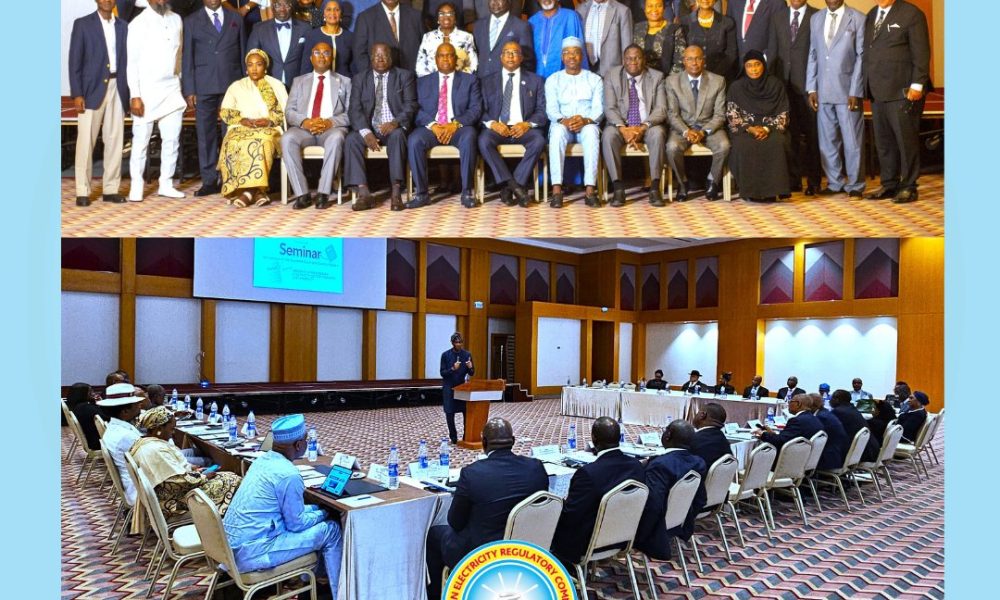The Nigerian Electricity Regulatory Commission (NERC) is promoting the awareness of the judiciary on the operations of the Nigerian Electricity Supply Industry (NESI).
To achieve their aim, NERC in a statement it shared on its official X account on Monday announced its collaboration with the National Judicial Institute (NJI).
The commission and the NJI have organized a seminar for Justices of the Supreme Court and Court of Appeal in Ikot Ekpene, Akwa Ibom State with the theme: ‘Reforms in the Electricity Sector towards Sustainability’.
In his address, the Administrator of NJI, Hon. Justice Salisu Garba Abdullahi, noted the sustained collaboration between NERC and the NJI especially in providing guidance towards steering a pathway to sustainable reforms in the electricity sector.
“I would like to express my heartfelt gratitude to the CJN for the guidance and I would like to appreciate the Justices of the Supreme Court and Court of Appeal for honouring the invitation to attend this seminar. At this stage, I wish you a fruitful deliberation,” Abdullahi said.
In his opening address, the Chairman of NERC, Sanusi Garba, represented by Commissioner, Finance and Management Service, Nathan Shatti, said it is the desire of the commission to continue to find ways to organize such engagements to deepen collaborations with the judiciary.
He said: “One of the key objectives of the seminar is to stimulate a discourse on emerging legal issues relating to the Nigerian Electricity Supply Industry, and to apprise the judiciary of the recent changes in the regulatory landscape.”
The Commissioner also told the Justices that NERC has transferred regulatory authority to seven states and that the Commission was prepared to continue to do more.
The Chief Justice of Nigeria (CJN), Justice Kudirat Kekere-Ekun represented by Hon. Justice Adamu Jauro declared the seminar open.
Kekere-Ekun acknowledged the role of electricity as a critical driver of viable economic growth prompting the need to sustain key reforms to improve the industry.
To achieve this feat, the CJN noted the imperative for judicial officers to understand the sector.
The NERC Commissioner, Legal, Licencing and Compliance, Dafe Akpeneye delivered a presentation titled, ‘Legal Framework for the Electricity Industry in Nigeria and Emerging Changes’ in which he explained the implications of the Electricity Act 2023 as a critical move to sustain the power sector reforms.
“Various states, comprising Ondo, Ekiti, Enugu, Imo, Oyo, Edo and Kogi have enacted their electricity laws and we have the potential of having more,” Dafe noted.
“NERC would be responsible for international trading in electricity, the general wholesale market inter-state market and the Federal Capital Territory until devolution.
“States would be responsible for intra-state electricity market, therefore, we need to be prepared for the significant issues arising from the unbundling.”
The NERC Commissioner however acknowledged the increased role of the judiciary in the changing landscape of the Nigerian Electricity Supply Industry (NESI) and handling of litigations.
“There is a change in approach with precedent flowing from suits filed by the Manufacturers Association of Nigeria (MAN) against the March 2024 tariff reviews. There are also practice directions for NESI matters.”
Also making a presentation on ‘Brief Overview of the Nigerian Electricity Supply Industry (NESI)’, NERC Commissioner, Consumer Affairs, Aisha Mahmud highlighted challenges in the NESI that impede its development.
“Addressing the challenges in NESI requires the under listed initiatives some of which are ongoing. They are: right pricing and reduction in energy theft, improved metering, improved investments, strengthened regulatory oversights and policy coordination.”
Commissioner Mahmud however noted the gains of a strong collaboration with the judiciary.
“Experience has shown that resolution of the NESI challenges can be made or marred by the Judiciary. Hence, a need for strong collaboration!” She said.
According to the Commissioner for Power in Akwa Ibom state, Engr. Camilus Umoh, in a presentation, the enactment of EA 2023 now allows states to develop their regulatory provision, noting that Akwa Ibom State is working to pass its electricity law.
“Our expectation is that we will have our state law in place by mid/end November, 2024.”

